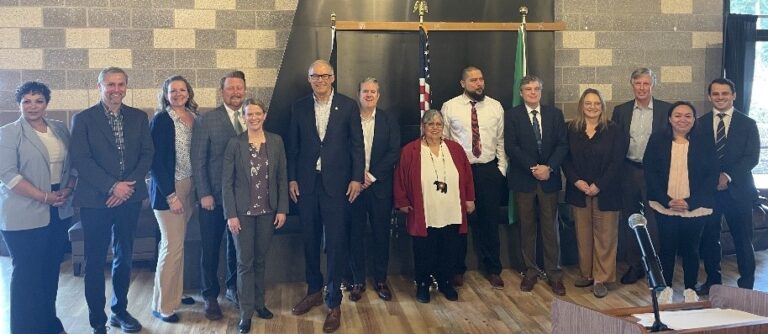Blog: How will hydrogen hubs benefit communities?

PNWH2 Board Members with Washington Governor Inslee and Chehalis Tribal representatives at the application submission announcement in April 2023.
In April 2023, the Pacific Northwest Hydrogen Association (PNWH2 Association) submitted its Regional Clean Hydrogen Hub funding application to the U.S. Department of Energy for the Pacific Northwest Hydrogen Hub (PNWH2 Hub). With Washington Governor Jay Inslee in attendance, the Confederated Tribes of the Chehalis Reservation welcomed the PNWH2 Board and community members from Lewis County and Centralia as we announced our application submission and shared the vision of what federal funding could do for communities throughout our region.
Lewis County ties to hydrogen
Lewis County was a natural pick as the location for this announcement. The PNWH2 Association Board includes representatives from Tribal and business leaders in the area, and Twin Transit – the area’s public transportation provider – is at the forefront of clean hydrogen. Twin Transit envisions a renewable energy fleet where a hydrogen bus can travel 325 to 375 miles on a single fueling and a future with hydrogen-powered public transportation up and down the I-5 corridor. Their efforts are already underway and set to positively impact their community in the coming years.
The PNWH2 Association Board comprises leaders like we find in Lewis County. We brought together a diverse group from the public and private sectors who understand hydrogen’s opportunity to develop a plan and application for DOE’s Regional Clean Hydrogen Hubs program grant.
Department of Energy will select federal grant recipients to establish hydrogen hubs nationwide
DOE will select six to 10 regional hydrogen hubs from across the country to form the foundation of a national clean hydrogen network.
While hydrogen use is common and the first renewable hydrogen projects in the Pacific Northwest are coming online in the near future, the connective infrastructure and technology to utilize clean hydrogen in our heavy transportation, agriculture and other hard-to-abate industries do not exist yet. For this reason, the first deployments of clean hydrogen technology by the Pacific Northwest Hydrogen Hub, if selected, are anticipated to be at least a couple of years out, with projects coming online as soon as feasible.
The U.S. set goals to achieve a carbon-free electric grid by 2035 and a net-zero emissions economy by 2050. Achieving those goals will take a massive effort requiring industry and government to take an all-hands-on-deck approach.
What are the community benefits?
Once DOE selects and finalizes the grant awards (anticipated by early 2024), the PNWH2 Hub project sites will be made publicly available. Why? During negotiations with DOE, some aspects of the planned hub’s scope and scale may be modified, potentially impacting what ultimately moves forward.
In all cases, we will work hand in hand with communities. At a high level, PNWH2 Hub community benefits could:
- Add tens of thousands of new jobs for the region’s economy by 2030 (plus advance and embed diversity, equity, inclusion and accessibility throughout the workforce)
- Retain additional jobs by retraining already experienced workers
- Enable science, technology, engineering and math (STEM) education program pathways to support the hydrogen workforce
- Commit private and proposed state funding
How will communities be incorporated into the plans?
Our vision incorporates engaging communities, Tribes, and labor stakeholders, which includes conducting significant ongoing outreach and communications to achieve and foster two-way communication and active public and stakeholder participation.
A guiding priority from the inception of this effort has been Tribal engagement and input. In addition to the Tribal representatives on the board, Tribal representatives participate on the PNWH2 Advisory Committee, and numerous Tribes are involved with proposed projects. Outreach from the state agencies and other partners in this effort has included participation from Tribal-led organizations such as Northwest Indian College in PNWH2 Hub review processes and outreach at several Affiliated Tribes of Northwest Indians events. Tribal voices and participation to date have been critical, and we know there is more work to do to ensure all Tribes with interest in this process have an opportunity to partner or provide input.
Labor representatives at all levels are part of the conversation as well. As PNWH2 Association Board Member and Washington State Labor Council, AFL-CIO April Sims shared, “The development of hydrogen as one part of a diverse spread of carbon-free energy options is an incredible opportunity for workers and their communities – if the values of high wages, good benefits, and strong retirement plans are centered in the conversation. Hydrogen development will help our state and our nation solve two existential crises facing our communities: runaway climate change and runaway income inequality.”